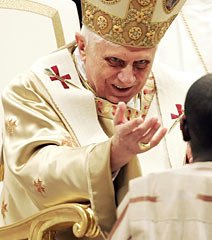 Boy I hate emergency rooms. I know they aren’t supposed to anyone’s favorite place. But, they are necessary because without them, God’s gifts, used in a variety of vocations, end up helping people. Right now they are helping my wife. She is very sick with an infection that has caused the left side of her face to swell up to three times its normal size. Clearly all of this is her fault. If only she had the kind of faith to believe that God wants her to get better. Actually I wish she had the kind of faith to never wind up here. I mean, all she seems to be thinking about is how much morphine she is going to get. All she seems to be thinking about is herself. For her right now, it’s all about me, me, me. Selfish, isn’t she.
Boy I hate emergency rooms. I know they aren’t supposed to anyone’s favorite place. But, they are necessary because without them, God’s gifts, used in a variety of vocations, end up helping people. Right now they are helping my wife. She is very sick with an infection that has caused the left side of her face to swell up to three times its normal size. Clearly all of this is her fault. If only she had the kind of faith to believe that God wants her to get better. Actually I wish she had the kind of faith to never wind up here. I mean, all she seems to be thinking about is how much morphine she is going to get. All she seems to be thinking about is herself. For her right now, it’s all about me, me, me. Selfish, isn’t she.What am I rambling on about? Well, this morning for my Sunday school class we went over a great article written by Rev. Todd Wilken in the latest issue of Higher Things. This time of year is a good time for “filler” as most of the high school age ragamuffins I teach are with their families visiting other relatives. But I really shouldn’t call the Higher Things magazine "filler". The magazine has more good theological content than do our official synodical magazines. What is supposed to be a “for kids” is something that I look forward to every time it comes to my door. It’s a great magazine, issue after issue, and I strongly recommend it to all. This morning, Rev. Wilken’s article led to a lively discussion on what is saving faith and what is the role of good works for the Christian.
Rev. Wilken, in this latest issue, tackles one of the most popular TV “evangelist” in America today, Joel Osteen, with an article entitled “Nice isn’t enough”. Joel Osteen has made his mark by promising to all who listen that God want all of us to have our best life now. In fact he wrote a book, (can you guess what the title is?)…… “Your best life now.” It is one of the all time best sellers that can be found in just about any store that carry “religious” books on its shelf. Joel states in his book that God wants to shower us with His blessings and all we have to do is believe. Our Lord wants us to get that choice parking spot at the mall. He wants us to go into the mall and find that tie we want on sale. He wants us to have the faith to believe that we will be upgraded, at no charge, from coach to first class on that flight to see our Aunt Lucy.
Rev. Wilken tackles the fact that Joel’s god is a nice god, I mean a very, very nice god. Joel’s god is so nice that he is willing to overlook the fact that we are sinful. Joel’s god overlooks sin and showers all who believe with the blessings that are due them… if they have the faith to believe.
Not covered in the Higher Things article was the story that Joel Osteen even went so far last week as to say on his televised TV show that if we all had the faith to believe, we could be assured that we would not be diagnosed with Alzeiheimers. He said that heart disease ran in his family and that he believed, no, he knew that the Lord of heaven and earth would not bother him with this little affliction.
Apparently Saint Paul didn’t read Joel’s book. In 2 Corinthians 12:7-9 Paul writes "And lest I should be exalted above measure by the abundance of the revelations, a thorn in the flesh was given to me, a messenger of Satan to buffet me, lest I be exalted above measure. Concerning this thing I pleaded with the Lord three times that it might depart from me. And He said to me, “My grace is sufficient for you, for My strength is made perfect in weakness.” Therefore most gladly I will rather boast in my infirmities, that the power of Christ may rest upon me. 10 Therefore I take pleasure in infirmities, in reproaches, in needs, in persecutions, in distresses, for Christ’s sake. For when I am weak, then I amstrong." So the apostle Paul asked three times and still the Lord thought it was a good thing that this thorn, whatever it was, was good?
And when Jesus became sin for us on the cross, did God overlook our High Priest offering himself up as propitiation? Who was Jesus talking to when he cried out “My God, my God why have you forsaken me?” I guess Jesus didn’t read the book either. The “nice” God allowed His Son to be sacrificed. That ain’t nice if you ask me.
There are many names for this kind of screwed up theology. Some people call it “name it and claim it” or “blab it and grab it”. But Lutherans like to call it the theology of glory. The theology of glory tries to make God nice. The theology of glory tries to tie our own works and thoughts and deeds to our well being or bank account. The more faith we have says the theologian of glory, the better off we will be. The theologian of glory winds up calling good evil and evil good.
But the theologian of the cross, in direct contrast, calls a thing what it is. He recognizes that what happens to us on this side of eternity is a result of us poor sinful creatures living in a sinful world. Our faith and our bank account or parking spots have nothing to do with one another. Our own works and our own faith in the end will only wind up damning us.
Our Lord does bless us and always will bless us through His Church. Through Word and Sacrament, we enjoy a foretaste of that heavenly banquet that is promised to us. Our Lord says he will bless us and he does, just not the way the world around us can recognize without the eyes of faith.
The Lord is blessing me this evening as I sit in room ER19 with my wife. Through vocation, whether they are believers or unbelievers, God’s gifts being utilized through the doctors and especially through our nurse Alicia, are administering aid to my wife. It is through their care that eventually we will be able to go home.
My wife’s faith is fine. She understands that on this side of eternity, bad things can and will happen, even to the faithful. She prays every day and she reads her Bible every day. She has confessed Christ so I know that by grace she is one of the elect. And thankfully, she doesn’t read or watch Joel Osteen. Because if she did, I sure her heart rate would be even higher than it is now.
Update:
Well, the missus is home from the hospital now. Basically she was diagnosed with parotitis, leukocytosis, and fever. To put that in layman’s terms, she had a massive infection of her left saliva gland. Right now she is pretty doped up and sleeping a lot. Mucho thanks to the family “A” for letting me crash their New Years Eve extravaganza for a bite to eat. At their next party the sushi is on me.



